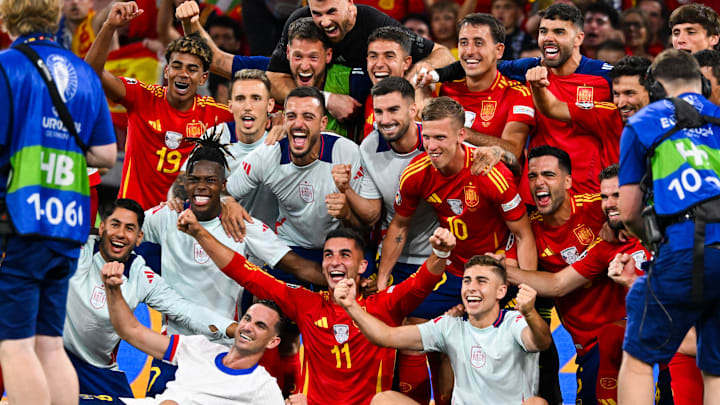No team at EURO 2024 has been as fluid, dynamic or entertaining as Luis de la Fuente’s Spain side. Six wins in six. Just three goals conceded and 13 scored. Dominance across disciplines.
They have been far and away the best team of the tournament, despite grappling with unfortunate injuries and untimely suspensions.
They now have a chance to reclaim their former glory and add another major international trophy to their cabinet as they prepare to face off against an unpredictable England side in the final, set to be played in Berlin on Sunday night.
Spain have notably slid down the “favorites list” at major tournaments over the last decade, with middling to embarrassing results in nearly every major competition since their 2012 European Championship victory, barring that one tumultuous semi-final run at EURO 2020.
But there’s no doubt this year. They are perhaps the unlikely best of the completely overblown rest. This is not the Spain of old, though. Well, it is, but a significantly modified version.
Contrary to his predecessor Luis Enrique, De la Fuente isn’t as stubbornly joined at the hip to his footballing philosophy, and certainly not to his own detriment.
He clearly values the classic Spanish traits of possession, passing and ball retention, and why wouldn’t he with such brilliant technicians as Rodri, Pedri, Fabián Ruiz and Aymeric Laporte, to name a few. But he isn’t overly obsessed with it. Instead of building the team around the ethos, he has flipped the switch and built the ethos around the team.
The biggest evidence of this shift comes from possibly the entire tournament’s two most exciting players: 22-year-old left winger Nico Williams and 17-year-old right winger Lamine Yamal.
These two forwards have provided Spain’s forever-elite midfield a much-needed outlet. A place to pass the ball that offers something that’s just a little different. A little chaotic, even. And of course, a little brilliant too.
Williams and Yamal, perhaps too young and naive to know any better, are not burdened with the existential crisis of retaining a playing identity or a passing structure. They are free. Free to play football every way they can. Free to not worry about waiting for the gaps or the mistakes or the chances. Free to go ahead and create it all themselves.
They were just two kids watching excitedly on television when Spain last reached a European Championship final in 2012. They are now just two kids having a kick about as they happen to carry their country to its next European Championship final this Sunday.
The magic isn’t just in the fact that Williams and Yamal have brought the team to this point; rather it’s the manner in which they have done it.
Spain have brought out a fluid, flexible, attacking brand of football that has seen them create more chances (96) than any other team in the tournament. Williams and Yamal are just the fresh faces of this team-wide overhaul.
For their history of winning, Spain have often struggled to balance their prevailing football dogmatism with their cold-blooded determination to win — both of which they have in spades.
This endless pursuit of pointless pragmatism in a possession-based frenzy has, unsurprisingly, not yielded the results they would have hoped.
But this is a different Spain team with a different identity. They want to control the game, but they aren’t obsessed with it. They want to retain the ball, but with a specific purpose. They want to pass effectively, but to progress the ball and create chances.
The thirst for control and possession has been quenched by the perfect balance, making Spain all the more dangerous.
And their journey to the final has reflected this. Unlike England, their side of the draw was significantly more challenging.
Having already bypassed Croatia and Italy in tough games during the group stages, Spain then took down heavy favorites, and gracious hosts, Germany in what many considered a knockout match worthy of a final. They clawed their way back from a one goal deficit to pull the plug on France’s hopes and reach their fourth ever Euro final.
What awaits Spain on Sunday at the Olympiastadion is a chance. One that isn’t reflected in the statistics, but one that they have, as a team, created nonetheless.
A chance to bring European glory back to the only consecutive winners of this competition. A chance to send a message to the world: the resurrection of La Roja is happening. A chance, like so many over the past month, they will hope to finish in dramatic style.
